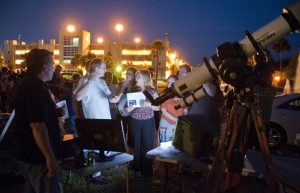GAINESVILLE, Fla. — Florida Museum of Natural History visitors will have an opportunity to tour the universe with astronomy experts during the seventh annual Starry Night event, from 6 to 10 p.m. Nov. 15.

Florida Museum of Natural History photo by Jeff Gage
Free, space-themed activities include a portable planetarium show and the opportunity to view the universe in 3D as well as rocks from space including a 70-pound meteorite.
Outside, visitors may gaze at the moon, planets and stars through professional quality telescopes and learn about the night sky with members of the Alachua Astronomy Club and UF astronomy department.
Visitors can pick up a “Passport to the Universe” to keep track of their activities. The first 25 attendees to complete the passport may receive tickets to the Kika Silva Pla Planetarium or other prizes.
“Visitors will experience space in new and exciting ways—from a planetarium show to looking through a professional telescope to seeing how scientists work in space,” said Florida Museum educator Amanda Harvey. “I love this event because space is amazing! The partners are brilliant and always looking for new and exciting ways to engage the public with the topic of astronomy.”
The evening also features a presentation by UF astronomy professor Rafael Guzman, an expert on galaxy evolution.
In his presentation, “The ‘Gran Telescopio de Canarias’: First Light of the Largest Optical Telescope on Earth,” Guzman will discuss the latest and largest of the new generation of giant, ground-based observatories that created a new era of astronomical discovery in the 21st century. Institutions in Spain and Mexico as well as the University of Florida built the telescope. Guzman will describe UF’s contributions to the project its world-class instrumentation and the profound results the telescope provided following its first light.
Starry Night is produced by the Florida Museum, University of Florida department of astronomy, Santa Fe College natural sciences department astronomy program, Kika Silva Pla Planetarium and the Alachua Astronomy Club Inc.
For more information, call 352-273-2062.
– 30 –
Writer: Katina Prokos, kprokos@flmnh.ufl.edu
Source: Amanda Harvey, aerickson@flmnh.ufl.edu, 352-273-2062
Media contact: Paul Ramey, pramey@flmnh.ufl.edu, 352-273-2054
Starry Night
6-10 p.m. Nov. 15
Activities list
7 p.m. The Gran Telescopio de Canarias: First Light of the Largest Optical Telescope on Earth
Join UF department of astronomy professor Rafael Guzman for a discussion on the Gran Telescopio de Canarias, the last — and largest — of the new generation of giant ground-based observatories. Discover more about UF’s contributions to this state-of-the-art telescope and its first scientific results ranging from the birth of the universe to the detection of new planets.
The following demonstrations and activities are ongoing from 6 to 10 p.m.
3-D AstroWall (presentations occur on the hour starting at 6 p.m.)
Experience the universe in 3-D! Glasses are provided.
Astro Activities
Learn about space with fun activities and interactive games!
Black Hole Hunters
Discover the mysteries of black holes.
Dinner Vendors
Enjoy tasty treats, roasted chestnuts and dinner under the stars from High Springs Orchard and Bakery.
Discover the Invisible Universe
Listen to radio waves emitted by the Milky Way using the Radio JOVE low frequency radio telescope. Learn how you can use this equipment to listen to radio waves from Jupiter and the Sun.
Gran Telescopio Canarias
Investigate the science and technology used to create the world’s largest telescope, the Gran Telescopio Canarias.
Kika Silva Pla Planetarium
Visit with the staff of the Kika Silva Pla Planetarium, and discover how their team is “bringing the universe to our community.”
PBS’s “Star Gazer” with James Albury (presentations at 6:30, 7:30, 8:30, 9:30 p.m.)
Watch the latest episodes of “Star Gazer” and meet its host James Albury!
Portable Planetarium Show (presentations every half an hour starting at 6:30 p.m.)
Enjoy the wonders of the constellations and the solar system with this fun and exciting show!
Prizes and Giveaways
Bring back your completed Passport to the Universe to receive a prize. A pair of free tickets to the Kika Silva Pla Planetarium will be given for the first 25 completed Passports!
Small Satellite Design Club
Visit the Small Satellite Design Club to learn about space systems and satellite design. Then learn how they use radio waves to “ping” satellites! Be sure to take a spin on the gyro-chair to get a hands-on learning experience on the principle of conservation of angular momentum!
Space Biology – UF Science on the International Space Station
See how UF scientists conduct experiments on the International Space Station and in space vehicles. See hardware that has flown in space and biological experiments designed for space experiments. Talk with scientists and students who work at Kennedy Space Center and other NASA facilities to find out what it is like to be a space biologist.
Space Rocks and Space Shuttle Tile
Meet staff from the Santa Fe College Astronomy Program and see the Campo del Cielo, a 70-pound meteorite, as well as a Space Shuttle tile. Discover the oddities of rocks from space and find out how they differ from Earth rocks!
Stargazing
View celestial bodies through professional quality telescopes with the help of professional and hobbyist astronomers from the University of Florida and the Alachua Astronomy Club.
Tim Malles Space Art
See an exhibition of space-inspired art by area artist Tim Malles, who contributed brass plaques to the Gainesville Solar Walk project on Northwest Eighth Avenue.
Tools We Use
Learn about the fascinating and unusual tools astronomers use to study the universe.
– ### –